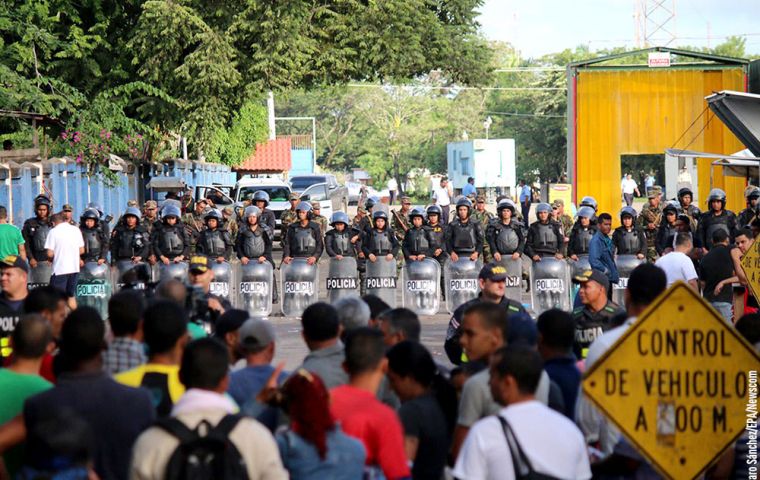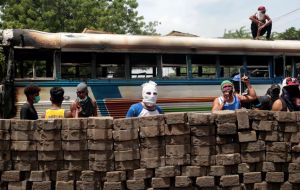MercoPress. South Atlantic News Agency
Nicaragua crisis: Many seek to flee the country
 As the crackdown progresses, the barrage of passport applications has increased markedly in the last two weeks.
As the crackdown progresses, the barrage of passport applications has increased markedly in the last two weeks.  In cities like Masaya, located 35 kilometers southeast of the capital Managua, neighbors organize food collection centers and shelters where the wounded are treated.
In cities like Masaya, located 35 kilometers southeast of the capital Managua, neighbors organize food collection centers and shelters where the wounded are treated. As the crisis worsens in Nicaragua, pressure on the part of society that demands the resignation of President Daniel Ortega remains. This generates that, in many cities like Masaya, the streets are blocked with more than 200 barricades while their neighbors organize to guarantee security and collect food for the protesters who are entrenched, resisting the paramilitary siege against the city. However, there has been an overflow of passport applications in recent weeks.
Demonstrators, mostly students, barricade behind blockades as a way to protest and protect themselves from the police and para-police repression of the Ortega regime. The socio-political crisis has already left 162 people dead, according to human rights associations, due to clashes that have lasted almost two months.
Thursday began with a national strike of 24 hours called by the Civic Alliance for Justice and Democracy and left 2 dead, one of them a boy of 15 years who was shot in the chest in the city of León. The strike, symbolic, sought to demand the end of government repression ahead the resumption of the national dialogue on Friday.
However, the violent state repression has caused thousands of Nicaraguans now desperately seeking to process migration documents to flee to neighboring countries in Central America.
The barrage of passport applications has increased dramatically in the past two weeks, as armed hooded men roam the streets at night on motorcycles and trucks, instilling fear among protesters and anti-government sectors.
The rows in immigration offices are endless, as families and young people try to leave in particular for Costa Rica, the main destination of Nicaraguans since the civil war of the eighties between the Sandinistas of President Daniel Ortega and the US-backed contras.
Nubia Manzanares, a migration agent, told AFP that “thousands of people come to ask about paperwork” every day.
According to the analyst and former opposition deputy Eliseo Núñez, part of Ortega's strategy is to incite panic to trigger migration, especially of the middle class, a particularly anti-government sector that represents a stone in the president's shoe that has taken the power for more than 11 years.
The vast majority of the country's roads are blocked by demonstrators; Transportation and commerce are almost paralyzed, leaving more than 70 million dollars lost and up to 150,000 jobs in danger, according to the Nicaraguan Foundation for Economic and Social Development (Funides).
For her part, Costa Rican Foreign Minister Epsy Alejandra Campbell Barr said last week that her government is prepared for a massive influx of Nicaraguans.
That Central American country also said days ago that it would provide visas to relatives of diplomats accredited in Nicaragua who want to leave.
Despite social and political pressures, everything seems to indicate that Daniel Ortega is determined to stay, and willing to continue the bloody clashes between armed forces supported by the government and activists who fight with homemade mortars and slings. “Regardless of the human cost,” Núñez said, Ortega will try to “navigate among the rubble and reach the end.”




Top Comments
Disclaimer & comment rules-

Read all commentsDanny, liberate them from their capitalist/facist oppressors.
Jun 18th, 2018 - 07:21 pm 0Commenting for this story is now closed.
If you have a Facebook account, become a fan and comment on our Facebook Page!